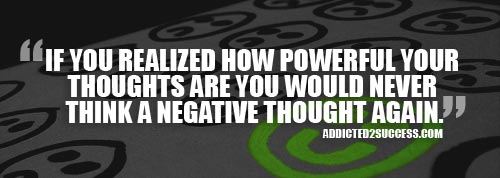Life
3 Simple Techniques To Keep Negativity Out Of Your Life
If you don’t control your mind, you will never control your life.
It doesn’t matter if you believe it or not, everything that gets inside your mind has a tremendous impact on how you feel, think and act. On what you achieve or don’t achieve. On who you become or don’t become.
Sometimes it’s so instantaneous that a great day becomes a nightmare after you hear a demotivating word or someone looks at you with an angry face.
Your mind starts doing its work, turning the seed that has been planted into something huge and out of control.
Do you feel that this situation is familiar?
This is the natural state of an unguarded mind.
The 2 Keys For Taking Control of Your Mind
You are exposed to thoughts and ideas all the time. Your mind picks the ones that have a bigger impact, positive or negative, and starts working on them until it receives something more impactful to replace them with.
This is one of the saddest elements of human nature I have found, but also one of the most encouraging.
If you are not aware of what’s going on in your mind, your life feels like a roller coaster, and your destiny is at the mercy of external factors.
So, how do you lock out all the negative factors and influences you are bombarded with all day, so they don’t impact you?
Simply put, you can’t.
If someone shouts angrily at you on the street, it’s going to impact you.
But what you can do is DECIDE whether your mind is going to pick that thought and turn it into a monster that ruins your day, or pick something optimistic and inspiring that lets you flow seamlessly through your day instead.
There are 2 key factors for taking more control over your subconscious:
- Reaction: How you react to your environment. How aware you are of when a bad thought is starting to grow in your mind and how fast you can take action to replace it with the thought you want to have there.
- Action: Placing in your mind the thoughts you want it to work on. Then letting them repeat, amplify and grow until you soak them up completely and they push you towards the goals you define for yourself.
After years of testing techniques to master my mind, I have collected a few that produce great results.
Here are three of my favorites:
1. Word Amplification
The simplest way to interact with your mind is by repetition of words.
If you detect your mind working on an idea that makes you feel bad, start repeating a word or sentence that makes you think immediately about something that inspires you or makes you smile.
For instance, if you would love to go to Japan on your next vacation, start repeating the word “Japan, Japan, Japan…” or the sentence “I’m in Japan.” It will make you feel better immediately and move your mind and feelings to a different place. .
A curious thing I have found is that using the exact opposite thought doesn’t work as well as using a thought that represents something different and positive for you.
If, for instance, you find yourself thinking that you don’t like your body and start repeating “I’m fit,” it will be harder to make yourself believe it and you will have to struggle to replace the negative thought.
If, instead, you avoid the fight and focus your mind on a different thought, you will forget the original thought more easily and soon everything will start to revolve around the new one.
Whenever you find yourself trapped by a negative thought, stop everything you are doing and repeat to yourself 10 or 20 times the most uplifting words you can find. Let your mind do its magic before coming back to your daily routine with renewed vigor and focus.

2. Painting The Picture Of What You Want To Achieve
This is a habit many successful people have used all their lives. In some cases, it is the only one they have kept after becoming extremely rich.
Write down your goals in the morning, at night, and every time you cannot remember clearly what you are aiming for and realize you are doing something that is not taking you closer to your goals.
After you have them in writing, take a minute to visualize each of them. If it’s hard for you to do this on your own, find some related pictures on the Internet.
This will help you start quickly producing bigger ideas for achieving your goals, what will get you out of your negative mental processes. Remember that the trick is to offer yourself thoughts that are bigger, more inspiring, and more exciting than the ones you are busy with at the moment.
Between two fruits, the monkey in your mind will always pick the one with the strongest flavor. And guess what, he doesn’t care if it’s sour or sweet.
3. Acting Like the Person You Want to Become (AKA Playing The Part)
You can call this technique “playing the part” or “fake it till you make it.”
Your goal here is to trigger a mental reaction from your physical actions. You have to ask yourself what the perfect version of yourself would be doing if they were in your shoes right now.
Then do it.
Well, you may ask, “What if I don’t know the details about the person I want to become?”
Let me give you some support and ask you a few questions to help you remember how you would like to be, or what you would like to have right now.
- What do you hate about your life? What would you like to have instead?
- What is missing in your life?
- What are the attributes and habits you would like to have?
- What do you enjoy doing but can’t do right now?
- If you had all the money and time in the world, how would you choose to spend your days?
There you have some food for thought to help you describe the perfect version of yourself.
Now forget about money and material things and think only about that human being. What would that person be doing now?
Start acting the part, and soon you will find that your thoughts seem to be more aligned with that person. You may start having thoughts that seem to come from a far more developed person, and that’s simply because you are acting like that.
Need Extra Help?
This is the magic of triggers. Cause and effect is one of the most amazing laws you can apply to your life. It can revolutionize the way you see and do things forever.
I have developed a blueprint based on these laws (and others) that can improve your lifestyle and career dramatically, in less than 10 days. You can get it for free here.
What techniques do you use to protect your mind from negative influences? Please share them in the comments field below.
Did You Know
How Skilled Migrants Are Building Successful Careers After Moving Countries
Behind every successful skilled migrant career is a mix of resilience, strategy, and navigating systems built for locals.

Moving to a new country for work is exciting, but it can also be unnerving. Skilled migrants leave behind familiar systems, networks, and support to pursue better job opportunities and a better future for their families. (more…)
Life
10 Research-Backed Steps to Create Real Change This New Year
This New Year could finally be the one where you break old patterns and create real, lasting change.

Every New Year, we make plans and set goals, but often repeat old patterns. (more…)
Life
9 Harsh Truths Every Young Man Must Face to Succeed in the Modern World
Before chasing success, every young man needs to face these 9 brutal realities shaping masculinity in the modern world.

Many young men today quietly battle depression, loneliness, and a sense of confusion about who they’re meant to be.
Some blame the lack of deep friendships or romantic relationships. Others feel lost in a digital world that often labels traditional masculinity as “toxic.”
But the truth is this: becoming a man in the modern age takes more than just surviving. It takes resilience, direction, and a willingness to grow even when no one’s watching.
Success doesn’t arrive by accident or luck. It’s built on discipline, sacrifice, and consistency.
Here are 9 harsh truths every young man should know if he wants to thrive, not just survive, in the digital age.
1. Never Use Your Illness as an Excuse
As Dr. Jordan B. Peterson often says, successful people don’t complain; they act.
Your illness, hardship, or struggle shouldn’t define your limits; it should define your motivation. Rest when you must, but always get back up and keep building your dreams. Motivation doesn’t appear magically. It comes after you take action.
Here are five key lessons I’ve learned from Dr. Peterson:
-
Learn to write clearly; clarity of thought makes you dangerous.
-
Read quality literature in your free time.
-
Nurture a strong relationship with your family.
-
Share your ideas publicly; your voice matters.
-
Become a “monster”, powerful, but disciplined enough to control it.
The best leaders and thinkers are grounded. They welcome criticism, adapt quickly, and keep moving forward no matter what.
2. You Can’t Please Everyone And That’s Okay
You don’t need a crowd of people to feel fulfilled. You need a few friends who genuinely accept you for who you are.
If your circle doesn’t bring out your best, it’s okay to walk away. Solitude can be a powerful teacher. It gives you space to understand what you truly want from life. Remember, successful men aren’t people-pleasers; they’re purpose-driven.
3. You Can Control the Process, Not the Outcome
Especially in creative work, writing, business, or content creation, you control effort, not results.
You might publish two articles a day, but you can’t dictate which one will go viral. Focus on mastery, not metrics. Many great writers toiled for years in obscurity before anyone noticed them. Rejection, criticism, and indifference are all part of the path.
The best creators focus on storytelling, not applause.
4. Rejection Is Never Personal
Rejection doesn’t mean you’re unworthy. It simply means your offer, idea, or timing didn’t align.
Every successful person has faced rejection repeatedly. What separates them is persistence and perspective. They see rejection as feedback, not failure. The faster you learn that truth, the faster you’ll grow.
5. Women Value Comfort and Security
Understanding women requires maturity and empathy.
Through books, lectures, and personal growth, I’ve learned that most women desire a man who is grounded, intelligent, confident, emotionally stable, and consistent. Some want humor, others intellect, but nearly all want to feel safe and supported.
Instead of chasing attention, work on self-improvement. Build competence and confidence, and the rest will follow naturally.
6. There’s No Such Thing as Failure, Only Lessons
A powerful lesson from Neuro-Linguistic Programming: failure only exists when you stop trying.
Every mistake brings data. Every setback builds wisdom. The most successful men aren’t fearless. They’ve simply learned to act despite fear.
Be proud of your scars. They’re proof you were brave enough to try.
7. Public Speaking Is an Art Form
Public speaking is one of the most valuable and underrated skills a man can master.
It’s not about perfection; it’s about connection. The best speakers tell stories, inspire confidence, and make people feel seen. They research deeply, speak honestly, and practice relentlessly.
If you can speak well, you can lead, sell, teach, and inspire. Start small, practice at work, in class, or even in front of a mirror, and watch your confidence skyrocket.
8. Teaching Is Leadership in Disguise
Great teachers are not just knowledgeable. They’re brave, compassionate, and disciplined.
Teaching forces you to articulate what you know, and in doing so, you master it at a deeper level. Whether you’re mentoring a peer, leading a team, or sharing insights online, teaching refines your purpose.
Lifelong learners become lifelong leaders.
9. Study Human Nature to Achieve Your Dreams
One of the toughest lessons to accept: most people are self-interested.
That’s not cynicism, it’s human nature. Understanding this helps you navigate relationships, business, and communication more effectively.
Everyone has a darker side, but successful people learn to channel theirs productively into discipline, creativity, and drive.
Psychology isn’t just theory; it’s a toolkit. Learn how people think, act, and decide, and you’ll know how to lead them, influence them, and even understand yourself better.
Final Thoughts
The digital age offers endless opportunities, but only to those who are willing to take responsibility, confront discomfort, and keep improving.
Becoming a man today means embracing the hard truths most avoid.
Because at the end of the day, success isn’t about luck. It’s about who you become when life tests you the most.
Change Your Mindset
The Four Types of Happiness: Which One Are You Living In?
Most people chase success only to find emptiness, this model reveals why true happiness lies somewhere else.

In a world driven by rapid technological growth and constant competition, many people unknowingly trade joy for achievement. (more…)
-

 News2 weeks ago
News2 weeks agoBrandon Willington Builds 7-Figure Business by Ignoring Almost Everything
-

 Health & Fitness3 weeks ago
Health & Fitness3 weeks agoWhat Minimalism Actually Means for Your Wellness Choices
-

 Did You Know2 weeks ago
Did You Know2 weeks agoWhy Most Online Courses Fail and How to Fix Them
-

 Business3 weeks ago
Business3 weeks agoIf Your Business Internet Keeps Letting You Down, Read This
-

 Business1 week ago
Business1 week agoEntrepreneur’s Guide to Pay Stubs: Why Freelancers and Small Business Owners Need a Smart Generator
-

 Business5 days ago
Business5 days agoThe Simple Security Stack Every Online Business Needs
-

 Scale Your Business5 days ago
Scale Your Business5 days ago5 Real Ways to Grow Your User Base Fast
-

 Business4 days ago
Business4 days agoThe Salary Shift Giving UK Employers An Unexpected Edge



























Pingback: Top 50 inspirational quotes by Joel Osteen